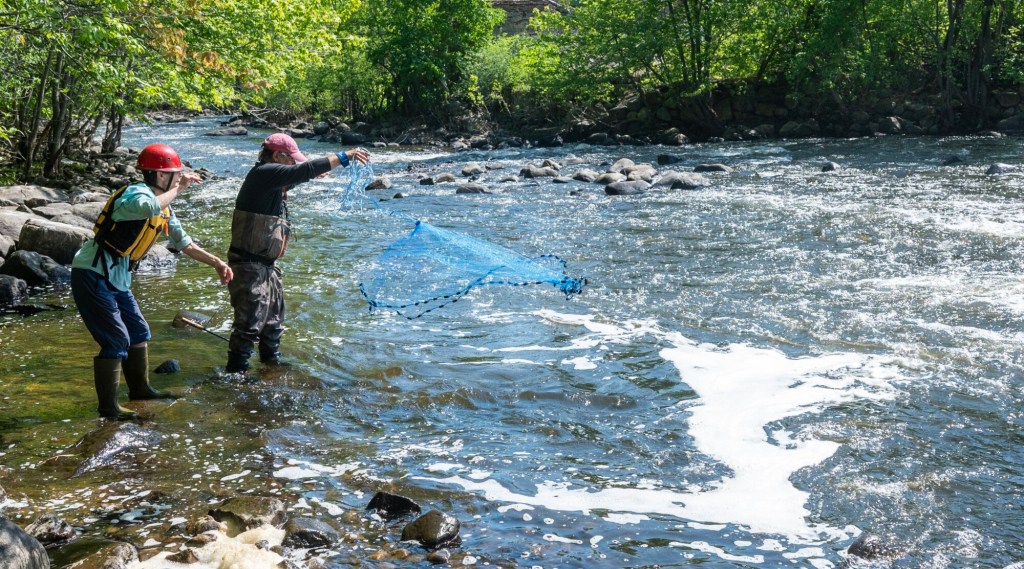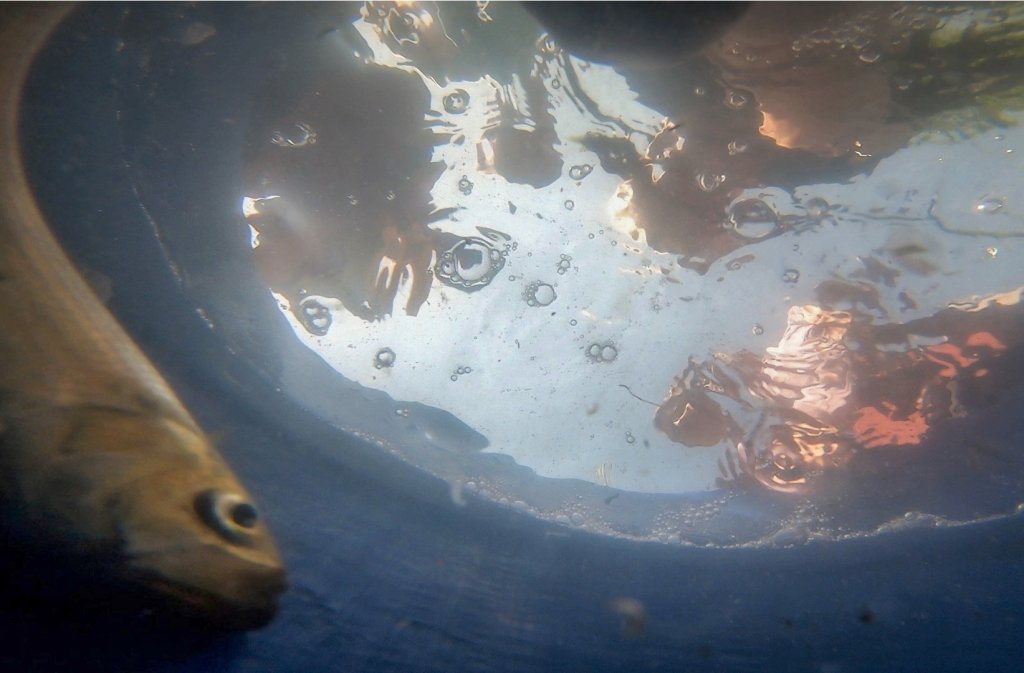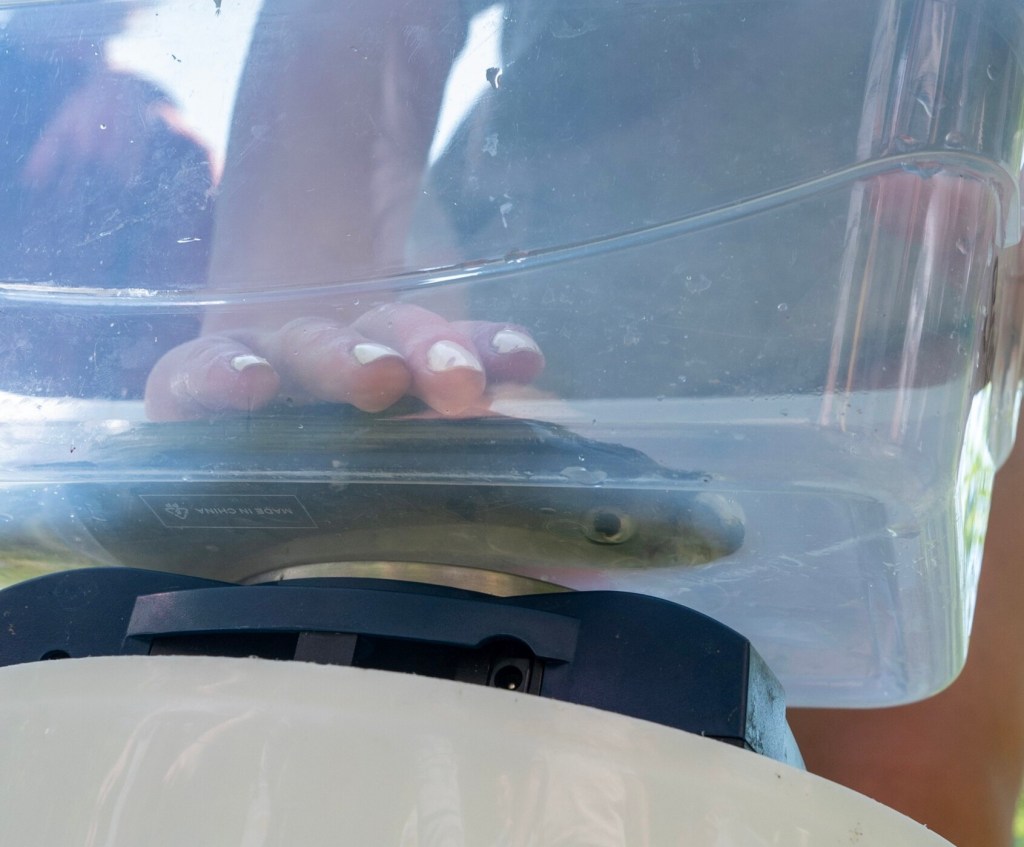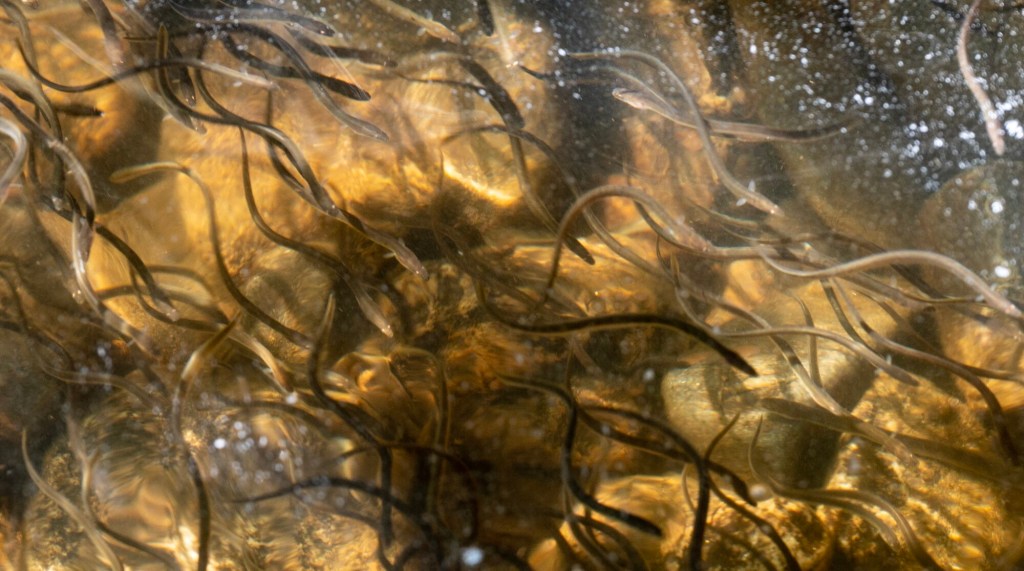GARDINER – On Wednesday morning, a group of high schoolers gathered by Cobbossee Stream were handed a white bucket filled with alewives. They carried the slender, gray-green, silver-bellied fish up the rocky riverbank to the top of New Mills Dam in Gardiner, where their classmates waited for the creatures’ arrival.
Once at the top, a student poured the fish into a small pool. Then, like an assembly line, each high schooler had a task to complete — some students weighed the fish, while others determined their sex, took samples of their scales and threw the alewives back into the stream.
The first-year students — and one senior — at Gardiner Area High School were participating in the school’s yearly tradition of helping count, measure and aid the fish in their annual migration from the ocean to inland freshwater, where they spawn. Helping to guide the process was local nonprofit Upstream, which aims to restore fish passage in that area that is interrupted by several dams.

Gardiner Area High School student Elise Clockedile, left, takes notes as classmate Keira Blodgett weighs an alewife Wednesday along Cobbossee Stream in Gardiner. Joe Phelan/Kennebec Journal
Usually, they start collecting samples the first week of May, but they delayed this year’s efforts because of the large amount of rain the area had received, which caused the stream to flood.
Gardiner-area teenagers have been assisting the nonprofit for the past five years, thanks to connections built by Earth science teacher Sharon Gallant, who recently won the 2023 Kennebec County Teacher of the Year award for her above-and-beyond efforts to engage students.
“It’s been really cool, but I’ve been telling everyone that it doesn’t happen on my own,” Gallant said. “I have an incredible science department and my administration lets me try all these wild and crazy things. It’s an ‘us’ thing, and without that I wouldn’t be able to do things like fish with Upstream.”
Gallant has taught Earth Science at Gardiner Area High School for 29 years. She recently retired as the school’s field hockey coach and is known by her peers for introducing unique and successful learning alternatives. When she saw students’ test scores failing, she introduced the option for them to “create a book” based on their knowledge of a given topic, and this year, she secured a $100,000 grant to support outdoor-based learning through a Maine Department of Education program that incentivizes innovative teaching approaches.
“It makes no sense not to teach Earth Science outdoors,” she joked.
One of the goals of restoring the fish passage through Cobbossee Stream is to bring the alewife harvesting industry back to Gardiner, which would bring in money for the city. The fish, once plentiful in Maine, are often used as bait for lobster, and sometimes for halibut.
But in order make that possible, Upstream and the Gardiner Area High School students must collect 10 years worth of data.
Gallant walked students down to the dam from the high school and explained what the students would be doing.

Gardiner Area High School student Keira Blodgett weighs an alewife Wednesday along Cobbossee Stream in Gardiner. Joe Phelan/Kennebec Journal
Wednesday was the group’s second time collecting the data this year, and the group had better luck the previous week catching the fish.
The alewives can tell when they are being collected, she explained, and will often swim to the middle of the stream to avoid being caught in a net. She used the situation as an example of a “real-life experiment” where variables can go astray and be unpredictable.
Upstream volunteers use nets to catch the fish, but if they are not cooperating, Gallant’s students can’t collect data. She said on average, the students collect data from about 500 fish.
Millions of fish make their way up the Kennebec River and Cobbossee Stream each year but are stopped by a series dams left over from when mills relied on them for power. Though only three dams remain on Cobbossee Stream, the large structures block the alewives’ route, preventing them from making it all the way up the stream to spawn.
Some communities, like Vassalboro, have installed fish ladders that aid the creatures over dams, and others have completely destroyed dams in order to help the fish make it to the shallow, flat water. Alewives are critical, as they are a keystone species, which means the ecosystem relies on them.
Steve Brook of Upstream was present Wednesday to help the students with the “organized chaos” of the assembly line method of collecting data and said Gallant’s students are “always eager to ask great questions.” He and his team of volunteers make sure the students are taking appropriate safety measures when collecting the fish.
First-year student Weslyn Mullins said he “never really” touched a fish before, and Brook taught him how to take a sample of the fish’s scales by using a pocket knife. The samples are then sent to the Department of Marine Resources which determines how old the fish are based on the size of their scales, similar to rings on a tree, said Gallant. The permit to collect the data comes from the Maine Department of Inland Fisheries & Wildlife.
“I had fun, but I’m mostly scared to drop the fish,” Mullins said.
Others in the group said they were thankful for the opportunity to leave the classroom and gain some hands-on learning with Gallant. One student, Jason Deering, lives right by the dam the students visited, and he said he “loved the experience” of being able to walk down and conduct a “real-life” science experiment.
And like the students, who were thankful to get outside and work with the fish, Gallant said the collaboration and bonding between the volunteers and teenagers is her favorite part of working with Upstream.
“They are 50 to 60 years apart in age and both have something to give to each other,” Gallant said. “It’s a great way for the younger generation of my students to see the volunteers and can see these are ‘normal Joe’s’ making an impact in the town and area. For me, that’s the part – the relationship building.”
Send questions/comments to the editors.







Comments are no longer available on this story